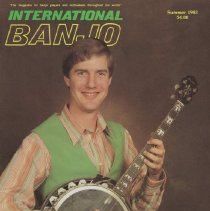Person Record
Images
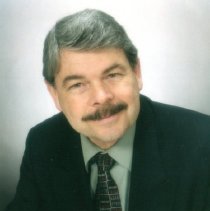
Metadata
Name |
Erickson, Eddie |
Othernames |
Fast Eddie Erickson |
Role |
Banjoist |
Places of residence |
California |
Titles & honors |
American Banjo Museum Hall of Fame Class of 2020 |
Sphere Of Activity |
Although universally respected as one of the finest plectrum banjoists in existence, with chameleon-like agility Eddie Erickson defies the assignment of a singular musical identity. As a banjoist capable of erasing decades of stereotypes with a single strum, he is equally at home in the world of jazz guitar. A Vaudevillian of the old school, he makes easy work of abandoning that persona to capture an audience with a soulful vocal rendition. From musician to entertainer, soloist to sideman, or comic to crooner, Eddie Erickson is a unique and beloved presence in the worlds of the banjo and classic jazz. Born in San Francisco in 1948, Eddie's first musical inspiration came from his father, "a closet guitarist who played for his own amazement." After learning to play the ukulele, the younger Erickson became enamored a particular tenor banjo at a local music store "because it was pretty." Gifted with the instrument with the condition that he'd pay for half of it with proceeds from his paper route, Erickson had a vested interest in learning to play that banjo. While listening to recordings of Eddie Peabody and Harry Reser provided the impetus to play the banjo well, it was hearing the free-flowing style of plectrum banjoist Perry Bechtel which truly inspired the young musician. At the age of 15 Eddie got his first professional gig at Me & Ed's Pizza (which lasted the entire two weeks that the owners didn't know he was underage). Unfazed by this setback, with youthful passion, a professional course was set in motion. Eddie soon switched to plectrum banjo and developed a serious interest in the guitar as well. In short order the influence of jazz guitar greats such as Joe Pass and Django Reinhardt found its way into both Eddie's guitar and banjo work while the steady gig at Capone's Warehouse in Monterey, California which followed became Erickson's university in learning about show business and being an entertainer. Although finding California's Monterey Peninsula energized Erickson's professional life, nostalgia entertainment was very much in-demand at Disneyland in Anaheim as well as the new Walt Disney World Resort in Orlando, Florida. With ever-growing music, vocal and comedic skills, Eddie Erickson was a perfect match for Disney. During the 1970s he bounced seamlessly between Disney properties as part of the Class of '27 show at the Diamond Horseshoe and Golden Horseshoe theaters and the Banjo Kings at the Magic Kingdom before taking the helm as leader of the Riverboat Rascals aboard the Empress Lilly in Lake Buena Vista, Florida. Concerned that his on-stage humor may be overshadowing his consummate musicianship (and tiring of Florida's humidity and bugs!), in 1984 Erickson returned to Monterey where his growing reputation within the jazz community saw him being invited to perform at festivals and elite jazz parties around the world. After a master's class in music and showmanship with Jake Stock as part of the Abalone Stompers, another stroke of good fortune brought Eddie together with vocalist Rebecca Kilgore and trombonist Dan Barrett. Their trio, along with bassist Joel Forbes founded B.E.D., a chamber jazz quartet which pushed Erickson to grow in the new and more demanding musical directions, resulting in what he considers to be his most fulfilling musical moments. Another delicious collaboration finds "Fast Eddie" paired with washboardist and vocalist "Big Mama Sue" Kroninger. Performing at festivals and shows as well as on critically acclaimed recordings, their unique partnership manages to capture an elusive blend of music and comedy, with one of those elements never diminishing the impact of the other. Often honored by his profession, respected by his peers, and adored by his fans, Eddie remains one of the most humble and accessible musicians in the world of jazz. Not a jack, but a master of many trades - each reflecting his talent, creativity, versatility and of love of music and his audience - Eddie Erickson hopes to be remembered much more simply as "a guy who plays music." Johnny Baier, American Banjo Museum |
Related Records
-
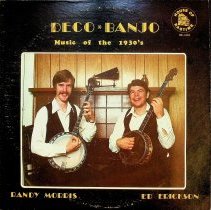
-
Fretted Instrument Guild of America All Frets January/February 2005 John Becker - Periodical
2005.010-0002
Record Type: Archive
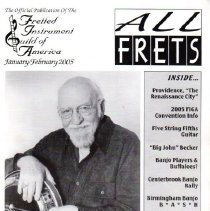
-
Fretted Instrument Guild of America ALL FRETS January/February 2006 Paul Doerner - Periodical
2006.003-0001
Record Type: Archive
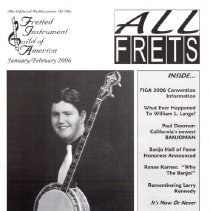
-
Fretted Instrument Guild of America All Frets January/February 2020 Marcy Marxer & Cathy Fink - Periodical
2020.002-0015
Record Type: Archive
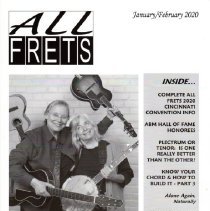
-
Fretted Instrument Guild of America ALL FRETS July/August 2009 Gary Ryan - Periodical
2009.002-0008
Record Type: Archive
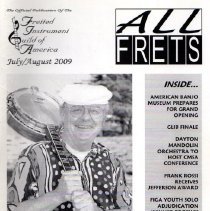
-
Fretted Instrument Guild of America FIGA News July/August 1975 Buddy Wachter - Periodical
2018.024-0062
Record Type: Archive
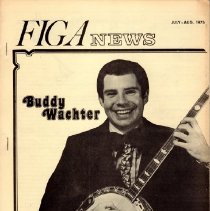
-
Fretted Instrument Guild of America FIGA News September/October 1975 Bill Bailey's Banjos - Periodical
2010.001-0023
Record Type: Archive
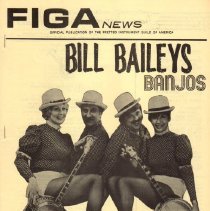
-
Fretted Instrument Guild of America July/August 1995 Joe Rodio - Periodical
2004.011-0042
Record Type: Archive
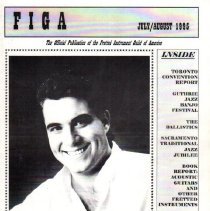
-
Fretted Instrument Guild of America March/April 1982 Mike Fultz - Periodical
2004.011-0067
Record Type: Archive
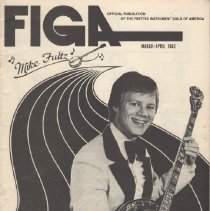
-
Fretted Instrument Guild of America November/December 1980 Charlie Khederian - Periodical
2004.011-0059
Record Type: Archive
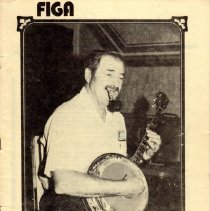
-
Fretted Instrument Guild of America November/December 1996 Bill Dendle & Fast Eddie Erickson - Periodical
2004.094-0018
Record Type: Archive
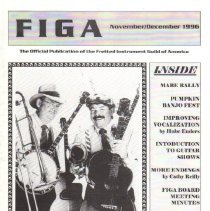
-
International Banjo Magazine January 1981 Earl Scruggs - Periodical
2000.001-0003
Record Type: Archive
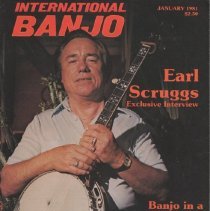
-
Magazine: Fretted Instrument Guild of America July/August 2007 Eddy Kebabjian - Periodical
2007.010-0009
Record Type: Archive
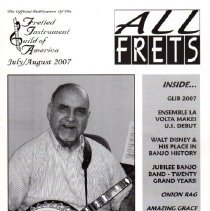
-
Magazine: International Banjo Magazine March/April 1981 Carl Jackson - Periodical
2000.001-0004
Record Type: Archive
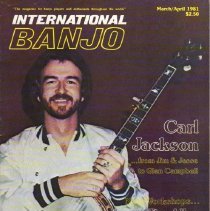
-
Magazine: International Banjo Magazine Summer 1983 Randy Morris - Periodical
2010.010-0023
Record Type: Archive
